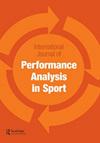Selected soccer players are quicker and better decision-makers in elite Brazilian youth academies
IF 1.6
4区 教育学
Q1 Health Professions
International Journal of Performance Analysis in Sport
Pub Date : 2023-02-25
DOI:10.1080/24748668.2023.2181609
引用次数: 5
Abstract
ABSTRACT Studies in talent identification and selection showed that more talented players usually possessed better decision-making skills. Nevertheless, studies on this topic have not yet been carried out: 1) assessing both decision-making time and quality based on offensive and defensive skills among selected and deselected youth soccer players; 2) neither assessed South American samples. This study aimed to compare the decision-making skills among selected and deselected players from Brazilian elite youth soccer academies. The sample comprised 317 Brazilian youth elite male soccer players (U-14, U-15, U-16, and U-17) from teams of the first national division in Brazil. Players’ decision-making skills, both quality and response time, were assessed with an objective video-based test (TacticUP®). Results showed that selected players, compared to those deselected, possessed advantages (p < 0.05) in every age group assessed on: 1) the decision-making time (U-16 and U-17); 2) the quality of decision-making (U-15); or 3) in both decision-making quality and time (U-14). Moreover, among all variables assessed (n = 72), the deselected players did not show any advantage compared to the selected ones. It is concluded that selected players by youth elite soccer academies in Brazil possess superior decision-making skills related to decision time and quality compared to those deselected.在巴西的精英青年学院,被选中的足球运动员是更快、更好的决策者
人才识别与选拔研究表明,越有天赋的球员通常具有越好的决策能力。然而,关于这一主题的研究尚未开展:1)在入选和未入选的青少年足球运动员中,评估基于进攻和防守技术的决策时间和质量;2)均未评估南美样本。本研究旨在比较巴西精英青年足球学院入选和未入选球员的决策能力。样本包括317名巴西青年精英男子足球运动员(U-14, U-15, U-16和U-17),来自巴西国家一级联赛的球队。通过基于视频的客观测试(TacticUP®)评估球员的决策技能,包括质量和反应时间。结果表明:各年龄组入选球员在决策时间(U-16和U-17)上均优于未入选球员(p < 0.05);2)决策质量(U-15);3)决策质量和时间(U-14)。此外,在所有评估的变量中(n = 72),未被选中的玩家与被选中的玩家相比没有表现出任何优势。结果表明,巴西青年精英足球学院选拔的球员在决策时间和决策质量方面的决策能力优于未被选拔的球员。
本文章由计算机程序翻译,如有差异,请以英文原文为准。
求助全文
约1分钟内获得全文
求助全文
来源期刊

International Journal of Performance Analysis in Sport
SPORT SCIENCES-
CiteScore
4.70
自引率
4.80%
发文量
38
审稿时长
>12 weeks
期刊介绍:
The International Journal of Performance Analysis in Sport aims to present current original research into sports performance. In so doing, the journal contributes to our general knowledge of sports performance making findings available to a wide audience of academics and practitioners.
 求助内容:
求助内容: 应助结果提醒方式:
应助结果提醒方式:


